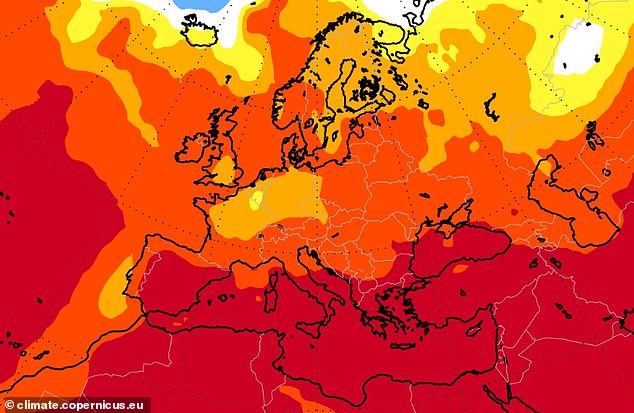Two more tourists have died in Greece after disappearing while out for a walk, the latest in a series of deaths in the country amid high temperatures that “make history.”
A Dutch tourist was found face down in a ravine by a fire service drone on the eastern island of Samos early Saturday morning.
According to local reports, the 74-year-old man was last seen struggling to walk in the heat and was discovered about 300 meters from where he was last seen.
Then on Sunday, a 55-year-old American was found dead by another tourist on a remote rocky beach on Mathraki Island after a friend reported him missing on Thursday.
The latest deaths came a day after two elderly people died in Cyprus, which has been hit by scorching temperatures exceeding 43C while parts of southern Europe have been hit by unusually high temperatures.
The deaths also follow the death of beloved British broadcaster and Mail columnist Michael Mosely, who disappeared while hiking on the Greek island of Symi.
The Copernicus Climate Change Service (C3S) seasonal forecast covering July, August and September predicts extreme and higher than average temperatures in the Mediterranean (pictured: probability of temperatures being in the highest percentiles of the climatology for seasonal means, with an ‘above-normal change exceeding the 80th percentile)
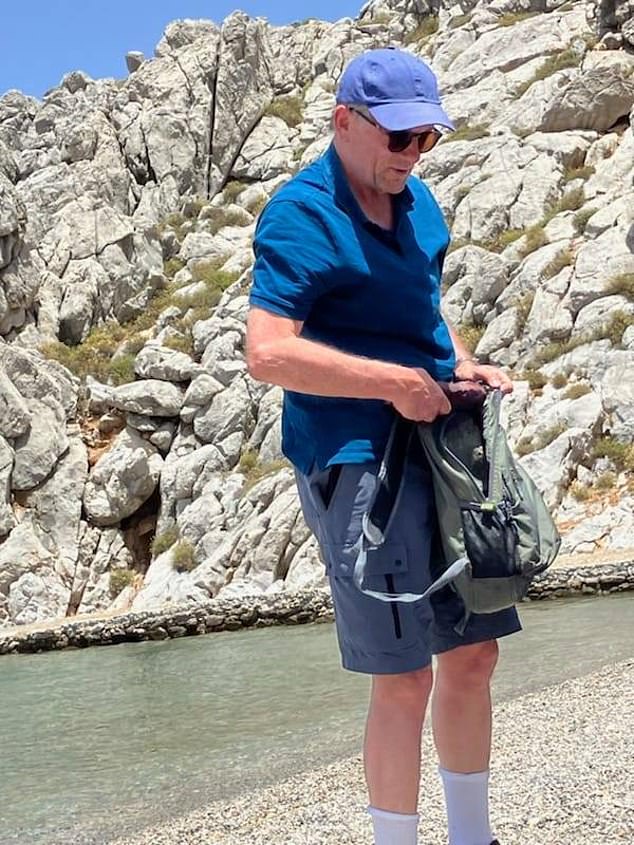
Dr Mosley was found dead on the Greek island of Symi on Sunday morning after taking the wrong turn down a mountain path.
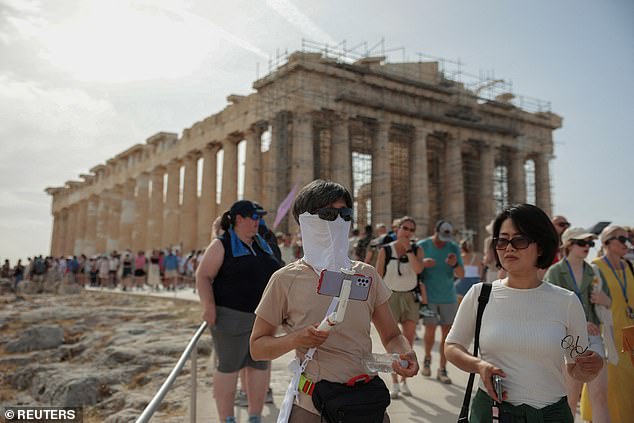
The Parthenon was closed this week, with members of the Red Cross on hand to hand out bottled water as temperatures soared across the continent.
Several tourists remain missing on the Greek islands as the scorching heat continues, including two French women and an American man named Albert Calibet.
A frantic search is underway for the former Los Angeles Sheriff’s Department deputy, who was last seen walking on the small island of Amorgos.
The two French citizens, aged 73 and 64, are also still missing on the island of Sikinos.
British tourists heading to Greece and Turkey are being warned to prepare for unusually high temperatures hitting holiday spots this week.
Meteorologist Panos Giannopoulos told Greek state television channel ERT: “This heat wave will go down in history.
“In the 20th century, we never had a heat wave before June 19. We’ve had several in the 21st century, but none before June 15.”
The scorching conditions are expected to continue this week and throughout the month, according to Greek meteorologist Giorgos Tsatrafillias.
‘Without a doubt, June this year is becoming one of the hottest months. Regarding the evolution, the first (unforeseen) estimate on the continuation of the summer is that the coming months will also be warmer than usual,” he stated.
He added, citing the Copernicus Climate Change Service, that the probability of temperatures being above normal levels in July, August and September is more than 60 percent.
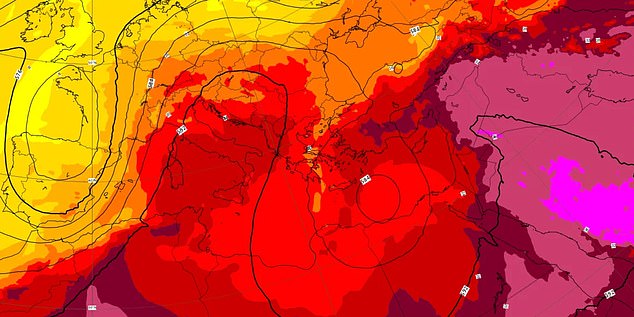
Pictured: Copernicus Climate Change Service graph predicts temperatures of up to 30 degrees across much of southern Europe this week.
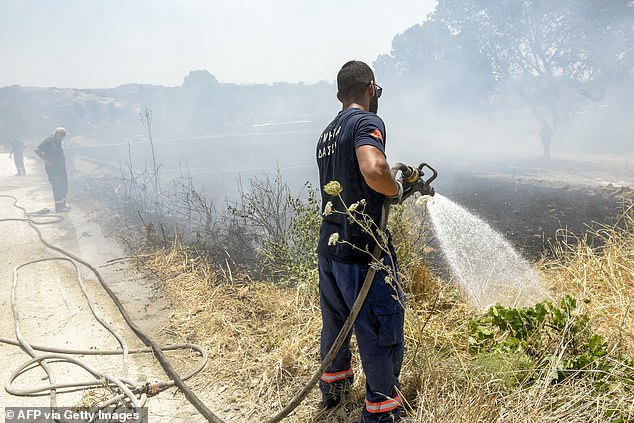
Firefighters in Cyprus have struggled this week to combat the spread of fires and strong winds.
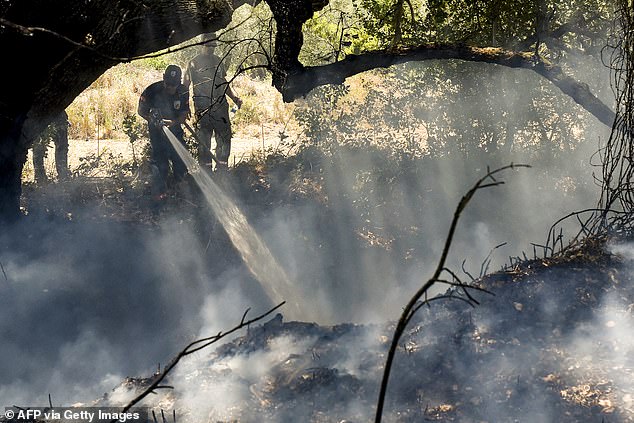
Firefighters from the Cyprus Forest Department extinguish a fire that broke out in the village of Choulou, western Cyprus, on June 12.
On Friday, an 84-year-old woman died a day after being admitted to hospital, said State Health Services Organization spokesperson Charalambos Charilaou.
When temperatures reached 45 °C (113 °F), the death of a 91-year-old woman was reported that same day.
Health officials said a woman died at Nicosia General Hospital due to heat stroke.
Charilaou told reporters that the woman suffered two cardiac arrests upon arriving at the accident and emergency department in Nicosia.
“After investigating the incident, emergency physicians determined that the cardiac arrest was the result of heat stroke,” Charilaou said.
He said hospitals have been dealing with cases of heat exhaustion for several days.
At least five other elderly patients were being treated in hospitals with severe heatstroke symptoms.
On Friday, Cyprus issued its first red alert of the summer for extreme heat, with the Meteorological Department confirming that maximum temperatures reached 45 degrees Celsius.
Due to extremely high temperatures, the Labor Inspection Department suspended heavy and moderate outdoor work in the afternoon.
Meanwhile, in Turkey temperatures have also soared between eight and 12 degrees above normal for this time of year.

A frantic search is underway for former Los Angeles Sheriff’s Department Deputy Albert Calibet, who was last seen walking on the small island of Amorgos.
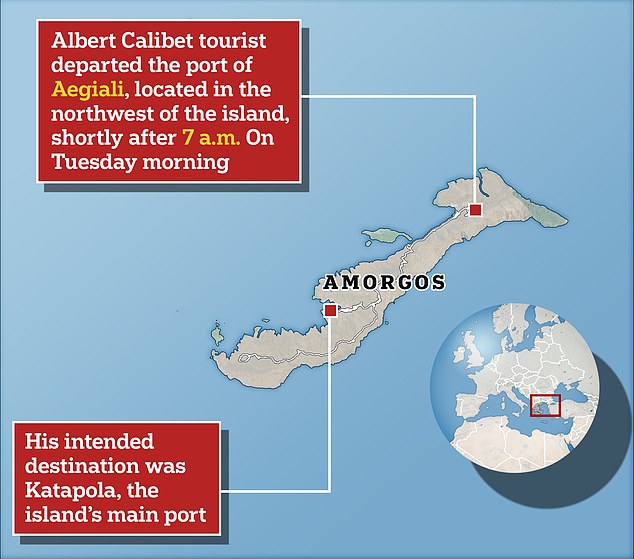
Climate experts say heat waves above 40°C are becoming longer lasting.
The Copernicus mid-range seasonal forecast (C3S), covering July, August and September, points to possible extreme weather conditions throughout the summer.
“The latter part of the European summer is likely to be warmer than average everywhere (with above-normal chances of exceeding the 80th percentile of seasonal climatology), drier than average in the south and wetter than the average in the far north. she says.
Amid hot and dry conditions, wildfires have gripped parts of Greece, with firefighters battling the flames on Friday and over the weekend.
Last week, 49 residents of two communities in the western district of Paphos on the island were evacuated to hotels as a wildfire threatened their homes, while planes from Greece and Jordan joined the firefighting efforts.
Greece was also forced to close its famous Acropolis to tourists this week as it braced for a 43C (109F) heatwave.
The Acropolis Hill, including the Parthenon temple, was closed from noon to 5 p.m. local time on Wednesday, and Red Cross staff were on hand to offer free bottles of water to tourists.
Many schools were also ordered to close until the end of the week.
The orders were followed by fires that, according to the National Observatory in Athens, consumed almost 175,000 hectares (432,000 acres) of forest and farmland.
In central Athens, the mercury rose to 42°C, and the expected heat prompted health warnings and school closures.
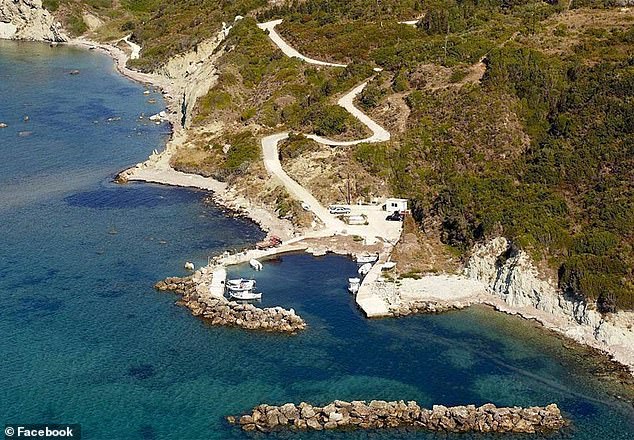
The body of an unnamed American man was found Sunday morning by another tourist on a rocky beach on the remote island of Mathraki, near Corfu.
According to the meteo.gr website of the National Observatory of Athens, even higher temperatures were recorded on the island of Crete (44.5 °C) and on the Peloponnese peninsula (43.9 °C).
Temperatures are being driven by southerly winds blowing hot air and dust northward from North Africa.
Last year, the country withstood deadly wildfires and floods during the summer holiday season, prompting the evacuation of tens of thousands of people.


